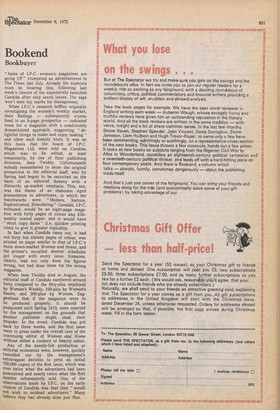Bookend
Bookbuyer
" Sales of I.P.C. women's magazines are going UP" trumpeted an advertisement in The Times last July. Already the euphoria must be wearing thin, following last week's closure of the expensively launched Candida after only seven issues. The saga won't earn top marks for management.
When I.P.C.'s research boffins originally investigated the women's weekly market, their findings — subsequently crystalised in an 8-page prospectus — indicated room for a magazine with a comfortably domesticated approach, suggesting "delightful things to make and enjoy making" and other such homely hints. It was on this basis that the board of I.P.C. Magazines Ltd. were sold on Candida, which was to be edited, at least temporarily, by one of their publishing directors, Jean Twiddy. Unfortunately nobody remembered to show the original prospectus to the editorial staff, who by Spring had begun to be recruited on the basis of an editorial dummy with a distinctly up-market emphasis. This, too, was the theme of an elaborate April presentation to advertisers, in which the watchwords were "Modern, Serious, Sophisticated, Stimulating." Candida, I.P.C. enthused, would be an eight-page magazine with forty pages of colour and Ellequality coated paper, and it would have "short copy dates" (i.e. quicker printing time) to give it greater topicality.
In fact when Candida came out, it had not forty but sixteen pages of colour, was printed on paper similar to that of I.P.C.'s more down-market Woman and Home, and the printer's so-called shorter schedules got longer with every issue. Someone, clearly, had not only done his figures wrong, but had done them for the wrong magazine.
When Jean Twiddy died in August, the editorial staff of Candida numbered around forty compared to the fifty-plus employed by Woman's Weekly, 100-plus by Woman's Realm, and 200-plus by Woman. Suggestions that if the magazine were to be produced properly, it should be Postponed until Spring 1973, were rejected by the management on the grounds that another publisher might steal their thunder. In the event, Candida was put back by three weeks, and the first issue went to press under the overall care of the continuing editor of Woman and Home Without either a cookery or beauty editor.
Any of the keenly-felt production or editorial economies were, however, quickly cancelled out by the management's extravagant decision to print an initial 750,000 copies of the first issue, which was over twice what the advertisers had been guaranteed and nearly twice what the first number subsequently sold. One of the Observations made by I.P.C. on the early closure of Candida was that they " would not wish to mislead advertisers." Many believe they had already done just that.










































 Previous page
Previous page